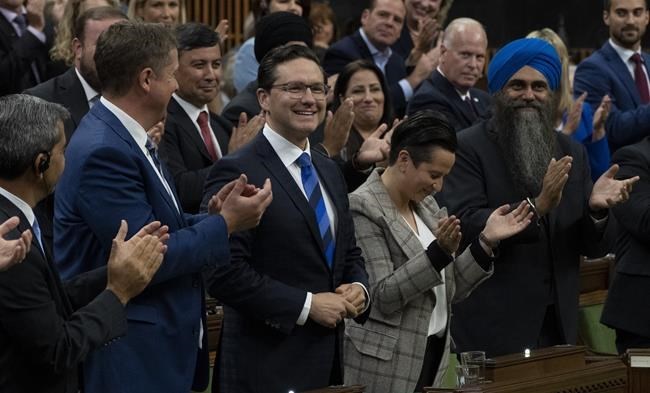OTTAWA — Affordability was the name of the political game on Tuesday as the House of Commons resumed for a fall sitting, but most eyes were on Pierre Poilievre as he made his debut in the Opposition leader's chair 10 days after winning the Conservative leadership contest.
Any sparks that may fly between Poilievre and Prime Minister Justin Trudeau will have to wait for Thursday, when Trudeau returns to the House following the United Nations General Assembly.
On Tuesday, the Liberals wasted no time introducing legislation to offer some brief respite to lower-income Canadians struggling to pay their bills amid soaring costs.
"In the last week, the prime minister made it very clear that the first order of business for this parliamentary session would be to make life more affordable for Canadians who need it most," said associate finance minister Randy Boissonnault.
"And today, we are delivering on that commitment."
Boissonnault introduced legislation to temporarily double GST rebate cheques. For a family of four, that could mean an extra $467 this fall.
Health Minister Jean-Yves Duclos put forth a bill to establish an interim $650 dental benefit for some children under 12 for this year and next, and provide a one-time $500 top-up to the Canada Housing Benefit for low-income renters.
In question period, Boissonnault said Canadians will "see two competing visions: one, where our government focuses on the needs of Canadians, and Conservatives telling the country that it is on its own."
Poilievre said all the Liberal benefit hikes will simply be "vaporized" by inflation. He has also said flooding the economy with extra money will drive up inflation.
When Liberal Families Minister Karina Gould said the government is also making life more affordable by cutting daycare costs in half for many people by the end of this year, Poilievre said because of the Liberals "people cannot even afford to have a family in the first place."
He wants the government instead to cancel planned increases to mandatory payroll deductions for the Canada Pension Plan and employment insurance premiums. He also wants them to kill the national price on carbon.
CPP contributions began increasing in 2019 so the federal government can increase CPP payments. In 2022, the maximum increase was $333, and it's expected to go up another $200 in 2023.
EI contributions tend to fluctuate, with the increase for a moderate income earner in 2022 hitting about $10 a month.
The Conservatives are making clear they won't support the bills to increase the GST or expand housing benefits. But both bills are expected to pass with support of the NDP, which has been lobbying for all three policies for months and put the housing benefit and dental care on its list of demands to sign on to the Liberal-NDP confidence and supply agreement.
"It did take a lot of work to get to this point, even to get this far," NDP Leader Jagmeet Singh said at a news conference Tuesday morning. "It took a lot of us fighting and forcing the government to act."
Singh remains heavily critical of the Liberal government, believing it waited too long to act on inflation. But the NDP made clear their main target in the coming months isn't Justin Trudeau but Pierre Poilievre.
A new NDP attack ad released on the internet goes directly at Poilievre. It portrays him as a leader who wants to protect the interests of wealthy corporate CEOs. It accuses him of voting against minimum wage hikes twice, and being supported by people who profited off the housing crisis.
"He's not in it for you," the ad repeats.
Government House leader Mark Holland said he was hopeful for political calm and co-operation to get work done for Canadians who really need help, but also took shots at Poilievre for putting forward an unserious cryptocurrency solution to the affordability problem.
"This is not a time for parlour tricks," Holland said at a news conference Tuesday morning.
"This is not a time for shell games. This is a time for real solutions."
The Liberals are keen to make Canadians aware that in March, while campaigning for leader, Poilievre promised he would normalize and promote cryptocurrencies like Bitcoin. He insisted at the time that investing in currencies that aren't influenced by central banks would allow people to "opt out of inflation."
Bitcoin, which had already fallen in value by almost one-third in the four months before Poilievre said that, has fallen by more than half in the six months since.
Holland said the Conservatives have now delayed their own private member's bill to develop a plan to grow cryptocurrencies. That bill, put forward by Alberta MP Michelle Rempel Garner in February, was supposed to come up for its second hour of debate on Tuesday afternoon.
Instead, the Conservatives put a different bill on the agenda to allow parents or grandparents of Canadian citizens to get a five-year visa to come to Canada.
In a statement, Rempel Garner's assistant said scheduling conflicts meant MPs agreed to move around debate time for three private members' bills. The House was to have returned Monday but that was pushed back a day because of the funeral for Queen Elizabeth.
The bill is now scheduled to be debated in three weeks.
This report by The Canadian Press was first published Sept. 20, 2022.
Mia Rabson, The Canadian Press




